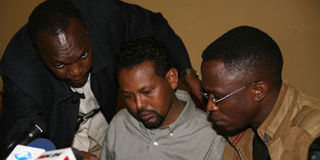Hope for new law as team seals deal

Parliamentary Select Committee chairman Abdikadir Mohammed (centre), vice chairman Ababu Namwamba (right) and committee member Jeremiah Kioni in Naivasha on Thursday. The committee is expected to hand over the amendments they made on the revised harmonised draft constitution to the Committee of Experts on Friday. Photo/HEZRON NJOROGE
An executive president answerable to an independent 349-member Parliament and checked by a strengthened Judiciary is the future the Parliamentary Select Committee on the constitution is recommending for Kenya.
After its nearly two-week retreat to discuss the contentious issues in the harmonised draft prepared by the Committee of Experts, the PSC also unanimously agreed to abolish the position of prime minister.
It proposed to increase the number of MPs to 349, creating 80 new constituencies; 47 seats reserved for women, 12 nominated to represent special groups and another 47 elected by the counties.
A president will be elected by all voters in a presidential election and will need 50 per cent plus one of all votes cast and at least 25 per cent of the votes in half of the counties.
The experts had recommended a system where the president and prime minister would share executive authority and be answerable to Parliament. The premier would be the leader with a majority in the House and MPs could be appointed to the Cabinet.
In their views to the experts, the public had said it wanted one centre of power — be it prime minister or president — under which the chief executive would be directly elected by voters. According to the Committee of Experts’ report of views expressed by the public, Kenyans were concerned that sharing power at the top would create instability.
Addressing the press at the end of the 11-day retreat at the Great Rift Valley Lodge in Naivasha, PSC chairman Abdikadir Mohamed said MPs appointed to the Cabinet would have to resign their seats. “When one is appointed minister, they will have to resign from Parliament so that we completely separate the Executive from the Legislature,” said Mr Mohammed.
Parliamentary elections will be held separately from presidential elections, with the former taking place in August of an election year and the latter coming four months later, the team resolved.
Imperial presidency
Mr Mohammed allayed fears that PSC had returned the country to the era of an imperial presidency, noting that “robust and independent” institutions had been created to check the Executive. “Imperial presidency existed because we had very weak institutions. We have created robust and independent Judiciary and Parliament. We have also put in place a very robust Bill of Rights so one’s rights will not be trampled upon,” he said.
The PSC also clarified that the Provincial Administration had not been scrapped but would be retained and restructured to fit in the devolved system of government. “We have revised Article 16 in the transitional chapter to make it clear that the Provincial Administration will be retained but restructured to fit into the devolved system,” the PSC deputy chair, Budalangi MP Ababu Namwamba said.
The committee also set the criteria for creating constituencies despite accusations from the Interim Independent Boundaries Review Commission that it was encroaching on its mandate. “I want to make it clear that we are not interfering with anybody’s mandate, it is the duty of the constitution to set the criteria for delineation,” Mr Mohammed said.
Sources in the committee had revealed that the decision to set the criteria for the creation of constituencies stemmed from apprehension among some MPs that the Andrew Ligale-led team could manipulate the boundaries for political purposes.
The misgivings were said to have been voiced by MPs allied to the Party of National Unity (PNU) who feared that Mr Ligale would favour the rival, Orange Democratic Movement (ODM), because of his previous association with the party.
Separate forces
On security, PSC resolved to create three organs, the Kenya Defence Forces, the National Security Intelligence Service (NSIS) and the Kenya Internal Security Service, comprising the regular and administration police as separate forces but reporting to one boss, the Inspector General just in the same manner the Kenya Navy, Kenya Air Force and Kenya Army report to the Chief of General Staff.
Under the new arrangement, the regular police and the administration police will be headed by a commandant reporting to the Inspector General. The MPs also removed a clause in the harmonised draft that required all sitting judges to step aside once the new constitution came into effect and be subjected to fresh vetting.
“The blanket dismissal of judges will not occur,” Mr Mohammed announced. The resolution is said to have been borne out of fears that such a drastic move would cripple the administration of justice. Mr Mohammed said all decisions taken during the retreat were arrived at unanimously and that at no time did the committee have to take a vote on any of the contentious clauses.
“We have had to make very serious political decisions on major issues such as the Executive, the method of representation such as the one-man-one-vote or one-kilometre-one-vote, the devolution and the nature of government. We have not had to vote on any one single issue and I salute my colleagues,” said Mr Mohammed.
He announced that PSC had left the chapter on the Republic intact, save for deleting the clause stating that Nairobi shall be Kenya’s capital city. “That would have meant that any time we want to move the capital from Nairobi, we would need a constitutional amendment,” he said. The PSC will return the revised harmonised draft constitution to the Committee of Experts on Friday afternoon.




